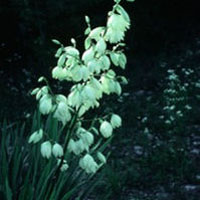Yucca
 © Steven Foster
© Steven FosterHow It Works
The saponins from yucca are the major constituents in the plant. They have both a water- and fat-soluble end and therefore act like soap. One preliminary trial reportedly found benefit for patients with osteoarthritis and rheumatoid arthritis.1 The authors of the study speculate that yucca saponins may block release of toxins from the intestines that inhibit normal formation of cartilage. This has yet to be proven in human pharmacological studies. An extract of one species of yucca has been found to fight melanoma cells in test tube studies.2 Clinical trials are lacking to prove whether yucca may be useful for treating cancer in humans.
How to Use It
Although the exact dosage of yucca for arthritis is unclear, some sources suggest up to 2 grams of yucca root in capsules per day.3 Alternatively, 1/4 ounce (7 grams) of the root can be boiled in a pint (500 ml) of water for 15 minutes. Three to five (750–1250) cups of this tea may be taken each day.4
Copyright © 2026 TraceGains, Inc. All rights reserved.
Learn more about TraceGains, the company.
The information presented by TraceGains is for informational purposes only. It is based on scientific studies (human, animal, or in vitro), clinical experience, or traditional usage as cited in each article. The results reported may not necessarily occur in all individuals. Self-treatment is not recommended for life-threatening conditions that require medical treatment under a doctor's care. For many of the conditions discussed, treatment with prescription or over the counter medication is also available. Consult your doctor, practitioner, and/or pharmacist for any health problem and before using any supplements or before making any changes in prescribed medications. Information expires December 2026.
